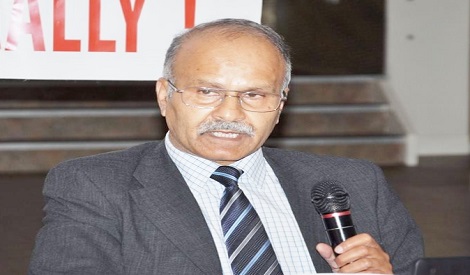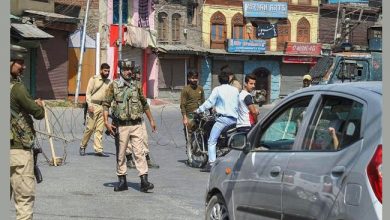Kashmir: What Next?

The conflict over the disputed territory of Kashmir is soluble only if pragmatic, realistic and tangible strategy is established to help set a stage to put the Kashmir issue on the road to a just and durable settlement. Since, we are concerned at this time with setting a stage for settlement rather than the shape the settlement will take, we believe that is it both untimely and harmful to indulge in, or encourage controversies about the most desirable solution of the dispute. Any attempt to do so at this point of time amounts to playing into the hands of those who would prefer to maintain a status quo that is intolerable to the people of Kashmir and also a continuing threat to peace in South Asia; and also amounts to playing into the hands of those who would like to give an impression that Kashmir is the most complex issue. Complexity is in the eyes of beholder. There is not a single international issue which is not complex. If there is an interest to resolve the issue then complexity becomes a motivating factor. If there is none, then complexity becomes an instrument of passivity and inaction.
The United Nations is in a unique position to play a more activist and mediatory role in regard to Kashmir by initiating a peace process. This can take the shape of:
1. Six-party talks– United Nations, China, Russia, India, Pakistan and Kashmir; or
2. an appropriate use of the newly developed procedures and mechanics at the United Nations.
In neither case would the handling of the dispute be a rehash of the old arid and acrimonious debates at the United Nations. The United States by itself or through the United Nations, would supply the catalyst that is needed for a settlement. There are alternative courses of action which can be spelled out and involved a sequence of interactive steps over a period of time. None of them would put the peace process in the straitjacket of rigid adherence to old texts. But if a solution of the problem will be a graduated process, consisting of incremental measures, the violence in Kashmir needs to be brought to a quick end in order to set the stage for a solution.
Today, the urgent necessities are:
a. To demilitarize the area of conflict – the state of Jammu & Kashmir – through a phased withdrawal of the troops (including paramilitary forces) of both India and Pakistan from the area under their respective control.
b. To take the sting out of the dispute by detaching moves towards demilitarization of the state from the rights, claims or recognized positions of the three parties involved. In order to do this, it might be necessary to make the demilitarization of the State the first step towards the reduction of Indian and Pakistani forces on their borders outside of Kashmir. It is after the peace-process is set afoot that the rights and claims of the parties can be considered in a non-violent atmosphere.
At times, various proposals have been made by different people to set a stage for a settlement of the long-standing conflict of Kashmir. Most of them seem to be absolute non-solutions. However, regarding solution, I would rule out one thing and that is doing nothing. Because time is not on the side of Kashmiris. Time will never heal the problem. Time has made the things worst in Kashmir. Let me mention one so-called ‘solution’ here.
Convert the existing cease-fire line into a permanent international boundary. This is the ideal non-solution. One cannot imagine a better formula for sowing a minefield in South Asia that will lead them to a nuclear disaster. To a Kashmiri, the line of control is a line of conflict. To talk about converting it into an international border is an insult to the intelligence of the people of Kashmir.
I believe that any future negotiations between India and Pakistan can be meaningful and successful if all parties concerned – Governments of India & Pakistan and the Kashmiri leadership – take the following steps:
First, Government of India must rescind the Domicile law which was enacted in 2020 simply to change the demography of Jammu & Kashmir. Until it is done, the people of Kashmir are on the brink of genocide.
Second, there has to be a cease-fire from all sides that must be followed by negotiations. Negotiations cannot be carried out at a time when parties are trying to kill each other.
Third, there cannot be and should not any precondition from any party, other than commitment to non-violence and to negotiations.
Fourth, the time has come that there must be a third- party mediation or facilitation or engagement to make sure that the talks between India and Pakistan remain focused. Third-party facilitator could be a person of an international standing.
Fifth, we do not need to invoke principles because, principles will not help launch a peace process. Principles can easily be twisted, and they lend themselves to various interpretations. But the principles that are involved in the Kashmir dispute shall remain guiding force in any final settlement. The principle # one: It is the inherent right of the people of the five zones of the State of Jammu & Kashmir to decide their future according to their own will. Principle # two: It is almost impossible to ascertain the will of the people except in a condition free from coercion, intimidation, or pressure from any quarter.
Sixth, the talks must be tripartite. The reason that talks must be tripartite is that the dispute primarily involves three parties – India, Pakistan and the people of Kashmir. But the primary and principal party are the people of Kashmir because it is ultimately their future, the future of 23 million people of Jammu & Kashmir that is to be decided.
Seventh, we want to emphasize that the Kashmiri people are for democracy. They believe that their leadership and the future disposition of the state must be ascertained through the democratic process. Kashmiri people will participate in the election if they are part of a process, which would eventually lead to the Kashmiris’ goal of self-determination. The election process must be organized and monitored by the United Nations. The elected representatives should have the mandate to enter into negotiations with India and Pakistan. Impartial and neutral monitors should supervise the whole process of election including the preparation of voter registration. The constitutional requirement for candidates to take an oath of allegiance to Indian Constitution has to be waived.
These ideas need refinement, but they build on the ineluctable truth that nothing fruitful is possible in Kashmir without the primary participation and willing consent of the Kashmiri people. Schemes and negotiations that neglect that truth are doomed to failure, as proven by 73 years of grim conflict in Kashmir with no end in sight.
Finally, history will testify that the final settlement of the Kashmir conflict undoubtedly brought peace and security not only to the State of Jammu & Kashmir but also to the whole region of South Asia – home to one-fifth of total human race.
Dr. Ghulam Nabi Fai is the Secretary General, Washington-based World Kashmir Awareness Forum. He can be reached at: 1-202-607-6435 or gnfai2003@yahoo.com




